Understanding Reservation Systems and How They Work in 2025
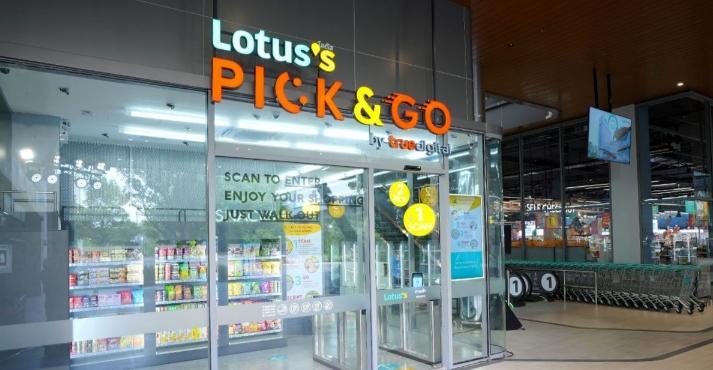
A reservation system lets you book things online. You can book hotel rooms, restaurant tables, or zipline trips. You can often do this from your phone. In 2025, reservation systems will work all day and night. This is because of new digital tools. People want fast help and easy bookings.
62% of Millennials use self-service even with 24/7 support.
Over 80% of customers want to talk to a service agent right away.
23% of companies will spend more on phone support for better access.
Modern reservation systems help staff and customers. Hotels and restaurants get smoother bookings and happier guests. Parks and other places have shorter waits and safer visits. Reservation systems give you more ease and better service.
Key Takeaways
Reservation systems help you book hotels and restaurants online anytime. This makes booking quick and simple. Modern systems show what is open right now. They send you a confirmation right away. You can change your booking without calling anyone. Businesses use reservation systems to make fewer mistakes. They save time and get more bookings. This helps them give better service to customers. AI and mobile personalization make booking smarter and faster. They also make it fit what you like. Picking the right system and teaching staff helps businesses work well. It also keeps customers happy.
Reservation System Basics
What Is a Reservation System
A reservation system lets you book a spot before you go. You might use it for a hotel room or a table at a restaurant. You can also use it for a coworking space. In 2025, most reservation systems are online. You can use your phone, tablet, or computer to book. Some people call them computer reservation systems or online reservation systems. These systems show you what is open, let you pick a time, and confirm your booking fast.
A reservation system does more than just save your spot. It links you with businesses and helps everyone avoid mix-ups. You get quick answers about what is open. Businesses know who is coming and when. This makes things easier for everyone.
Main Features
Modern reservation systems have many tools that help you and businesses. Here are some of the top features:
Real-time availability: You see open spots or rooms right away. This stops double bookings and saves time.
Multi-platform access: You can book from your phone, computer, or social media.
Automated confirmations: The system sends a message or email to confirm your booking. You do not need to call or wait.
AI-powered personalization: The system suggests times or services you might like.
Chatbots and self-service: You can ask questions or change your booking without waiting for help.
Booking management: Businesses can track bookings, see who is coming, and plan staff.
Integration with calendars: Your booking can sync with Google Calendar or Outlook, so you remember.
Automated conflict resolution: If there is a problem, the system finds another time or spot.
Resource management: Some systems let you book equipment, food, or special setups.
24/7 access: You can book any time, day or night, which helps if you remember late.
Did you know? Automated reservation systems can save staff booking time by up to 25%. They can also cut booking problems by 40%. Some businesses see their occupancy rates go up by 30-45% after switching to an online reservation system.
Reservation systems help stop mistakes. When you book online, you use dropdown menus and clear forms. This means fewer errors and less confusion. The system follows rules, so you do not get double-booked or lose your spot. Automated reminders and confirmations help you remember your booking and lower no-shows.
Types and Industries
You see reservation systems in many places. Hotels, restaurants, coworking spaces, and travel companies all use them. The travel industry uses centralised reservation systems and online travel agencies to handle lots of bookings every day. In 2023, travel apps made $629 billion, with hotels and places to stay making most of that. Booking, Expedia, and Airbnb are the leaders, with Booking handling 25% of all hotel bookings worldwide.
Here is a quick look at where you might use a reservation system:
Industry | How Reservation Systems Help You | Popular Platforms |
|---|---|---|
Hotels | Book rooms, check availability, manage stays | Booking, Expedia, Airbnb |
Restaurants | Reserve tables, order ahead, avoid waiting | Tablein, OpenTable |
Coworking Spaces | Book desks, meeting rooms, or event spaces | Deskpass, LiquidSpace |
Travel | Plan trips, book flights, cars, and activities | Online travel agencies, Kayak |
Health & Wellness | Schedule appointments, manage reminders | Zocdoc, Mindbody |
Online travel agencies have changed how you book hotels and trips. They use cloud-based booking systems that are fast and simple. These platforms let you compare prices, read reviews, and book everything in one place. The market for reservation systems keeps growing. More businesses are moving to online booking system solutions for better service and higher profits.
How It Works in 2025
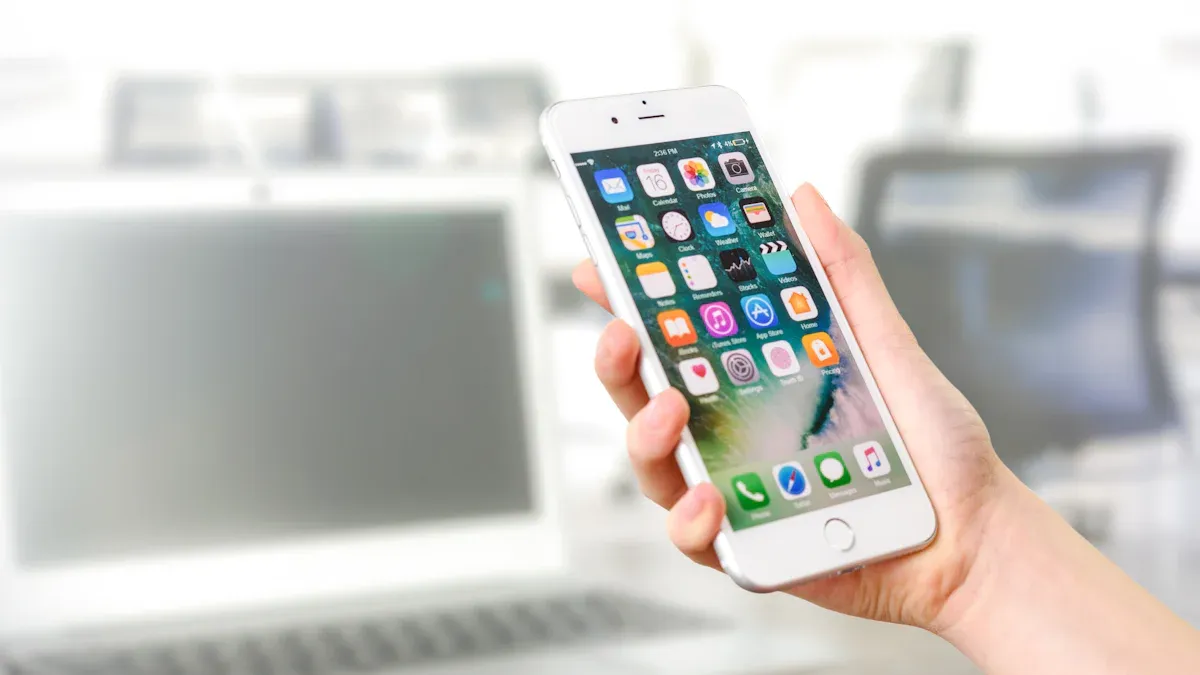
Booking Process
You want to book a hotel room, a table at your favorite restaurant, or even a spot for a yoga class. The booking process in 2025 feels fast and easy. You open an app or website. You pick what you want and see what is open. You choose your time and confirm your spot in just a few taps.
Digital tools make this booking process much quicker than before. For example, train reservation systems now cut booking time in half compared to old methods. You do not wait in long lines or fill out paper forms. The system gives you instant confirmation, so you know your spot is saved. You can book at any hour, even late at night or early in the morning. This 24/7 access means you never miss out.
Hotels also use digital platforms that sync bookings across all channels. If you book a room on one site, it shows up everywhere right away. This stops double bookings and mistakes. You get a smooth experience, and staff spend less time fixing errors. The whole process feels simple and stress-free.
Tip: Always double-check your details before you hit confirm. Most reservation systems let you review your booking before you finish.
Real-Time Availability
You want to know if a spot is open right now. Real-time availability gives you that answer. When you use a reservation system, you see live availability online. The system updates every second. If someone else books a spot, you see it disappear right away. This helps you avoid disappointment and wasted time.
Let’s look at how systems measure reliability and uptime:
Metric | What It Means | Why It Matters |
|---|---|---|
Average time the system works before a problem happens | Shows how long you can trust the system to work | |
Mean Time To Failure (MTTF) | Average time until a part fails | Helps predict when repairs might be needed |
Failure Rate | How often the system has problems | Lower rates mean fewer booking issues |
Availability Percentage | How often the system works without downtime | High numbers mean you can book anytime |
Availability Formula | Combines uptime and repair time | Shows how ready the system is for your booking |
Most reservation systems in 2025 use tools to track these numbers. They fix problems fast and keep everything running. You get a reliable experience, whether you are making an appointment booking or grabbing a last-minute dinner spot.
Payment and Security
You want your payment to be safe and simple. In 2025, reservation systems use secure payment gateways. You can pay with a card, digital wallet, or even a tap on your phone. The system encrypts your details, so hackers cannot steal your information.
Many platforms use two-factor authentication. You might get a code on your phone to finish your booking. This extra step keeps your account safe. Some systems also use biometric checks, like a fingerprint or face scan, for even more security.
You get a receipt right away after you pay. The system stores your booking and payment details in your account. If you need to change or cancel, you can do it online without calling anyone. This makes the whole process smooth and worry-free.
Note: Always use trusted sites and apps for your bookings. Look for the lock symbol in your browser to know your connection is secure.
Streamline Bookings for Businesses

Operational Efficiency
You want your business to work well. Modern reservation systems help make bookings easier and cut mistakes. Smart scheduling means fewer mix-ups and less wasted time. Many companies see 30% fewer scheduling problems after using these systems. You also get 25% more client bookings in six months. More people use your services without extra work for your team.
Here are some ways reservation systems help:
Customers can book by themselves, which saves time.
Staff spend less time on the phone and more time with guests.
Double-bookings and last-minute problems are avoided.
You can check equipment and space use with a few clicks.
A midsize tech company had 35% better meeting efficiency and 20% happier employees after using smart scheduling. You can get results like this when you use these tools in your business.
Increased Revenue
Making bookings easier helps you get more sales. Customers can book any time, so you fill more spots. Businesses using smart scheduling apps see 25% more bookings. There are also fewer cancellations and no-shows, so you earn more money.
You can use real-time data to see busy times and change prices or staff. This helps you use every hour well. Companies that use real-time scheduling data can save up to 80% of lost work time. That saved time can mean more bookings and higher profits.
Tip: Happy customers return. Easy booking helps keep customers and grow your business.
Analytics and Insights
Reservation systems do more than help with bookings. They give you useful analytics and insights. You can see your busiest times, most popular services, and how often equipment is used. This information helps you plan and stop waste.
With these insights, you can:
Plan staff and supplies for busy times.
Make special offers to bring customers back.
Watch sales trends and find new chances.
Keep customers by knowing what they want.
Cloud-based and AI-driven reservation systems help your business grow. You can use customer journey analytics to get more bookings and lose fewer customers. When you make bookings easy and use these insights, your business can grow for a long time.
Customer Benefits
Convenience
Booking should be fast and simple. Modern reservation systems make this possible. You can book a table, hotel room, or appointment from your phone. You do not have to call or wait for business hours. Just tap, pick a time, and get a confirmation right away.
Here are some ways reservation systems help you:
Book anytime and anywhere, even late at night.
Change or cancel your booking without talking to anyone.
Get instant confirmation and reminders by email or text.
See what is open in real time before you book.
Use social media or apps to book in a few steps.
Get suggestions based on what you booked before.
A recent study found that 47% of diners like booking online more than calling. About 34% of people pick a restaurant if it has online reservations. These numbers show that convenience is very important to you.
Transparency
You want to know what you are getting before you book. Reservation systems show you all the details first. You can see open times, prices, and even pick your favorite spot. This helps you plan and stops surprises.
You can check your booking before you confirm it. This means fewer mistakes and less stress.
Automated reminders help you remember your plans. You can trust your spot is saved. If you need to change something, you can do it yourself. This clear process gives you more control and builds trust.
Experience
A smooth booking experience makes your day better. You feel special when the system remembers what you like. It offers you the best options. Automated reminders help you show up on time. Online scheduling software can cut no-shows by 29%. This means you waste less time and enjoy your plans more.
Reservation systems also make things faster and more reliable. You get updates right away, fewer mistakes, and more choices. Businesses can focus on helping you, not just making bookings. This gives you a better experience every time you book.
Implementing a Reservation System
Choosing a System
You want a reservation system that fits your business. Start by looking at what you need most. Do you want to handle bookings from many places? Do you need to connect with your payment system or CRM? Here are some things to check before you decide:
Can the system handle bookings from your website, phone, and social media?
Does it work well on mobile devices?
Can you customize booking forms and send reminders?
Does it give you reports on sales, profits, and customer trends?
Will it update your calendar in real time to avoid double bookings?
Does it keep payments safe with strong encryption?
How many booking channels does it support?
Can it help you cut down on no-shows and boost your bookings?
A good system should help you save time, reduce mistakes, and make your customers happy.
Integration
You want your reservation system to work with your other tools. Many systems now connect with POS, payment, and calendar apps. For example, some restaurants use software that links reservations with order processing and billing. This makes everything run smoother and gives you better customer insights.
You can also use systems with API access. This lets you automate tasks and customize the system for your needs. Hotels, spas, and golf courses use these features to cut down on manual work and improve customer service. When you connect your reservation system with your business tools, you can reduce errors, fill more spots, and keep customers coming back.
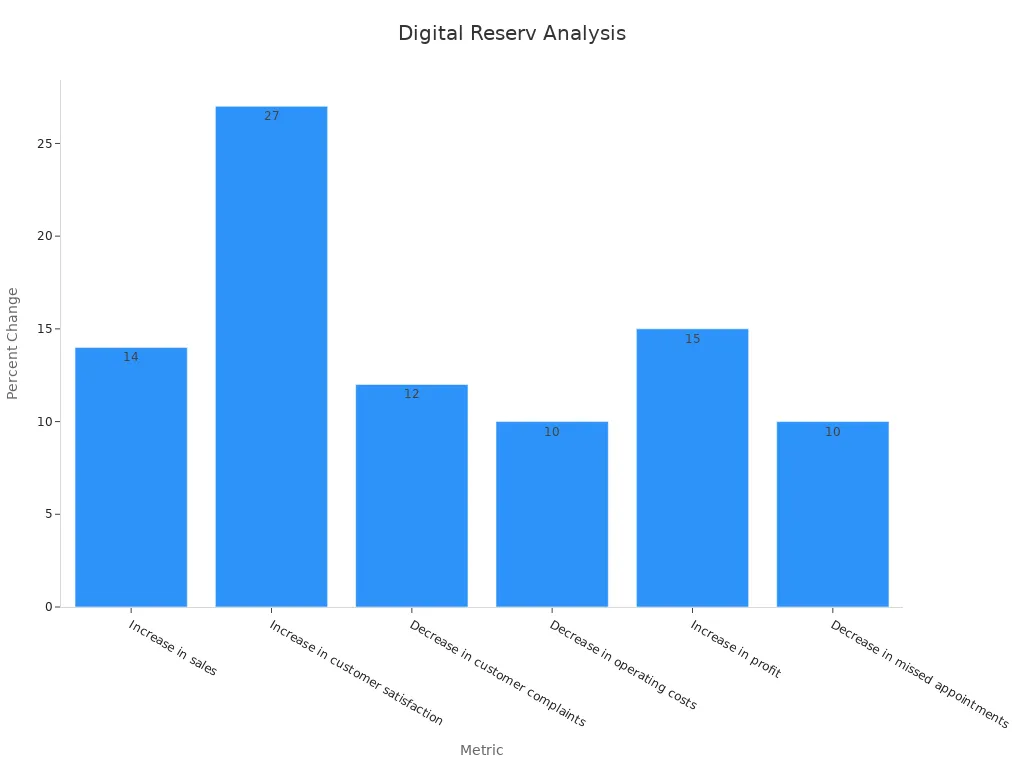
Staff Training
You want your team to feel confident using the new system. Start with a simple training session. Show them how to add, change, or cancel bookings. Teach them how to check real-time availability and send reminders. Let them practice with test bookings.
Tip: Give your staff a quick guide or checklist. This helps them remember each step and avoid mistakes.
When your team knows the system, they can help customers faster and with fewer errors. You will see fewer missed appointments, happier guests, and a smoother day for everyone.
Future Trends
AI and Automation
In 2025, you will see AI and automation in many reservation systems. These tools help you book faster and get better help. AI can answer questions and suggest good times for you. It can also fix booking problems before you know about them. Many online travel agencies use AI chatbots to handle most booking calls. You get help right away, even if it is late at night.
Here is how AI and automation make things better:
Metric Description | Quantified Impact |
|---|---|
Increase in direct bookings (hospitality) | 25% |
Improvement in customer satisfaction (airlines) | 40% |
Booking calls handled without human help | 95% (small business case) |
Increase in bookings | 35% |
Reduction in no-shows | 60% |
Increase in average transaction value | 22% |
Reservation processing speed vs. humans | 60-70% faster |
Completion rates without human help | 85-95% |
Reduction in call abandonment rates | 40-60% |
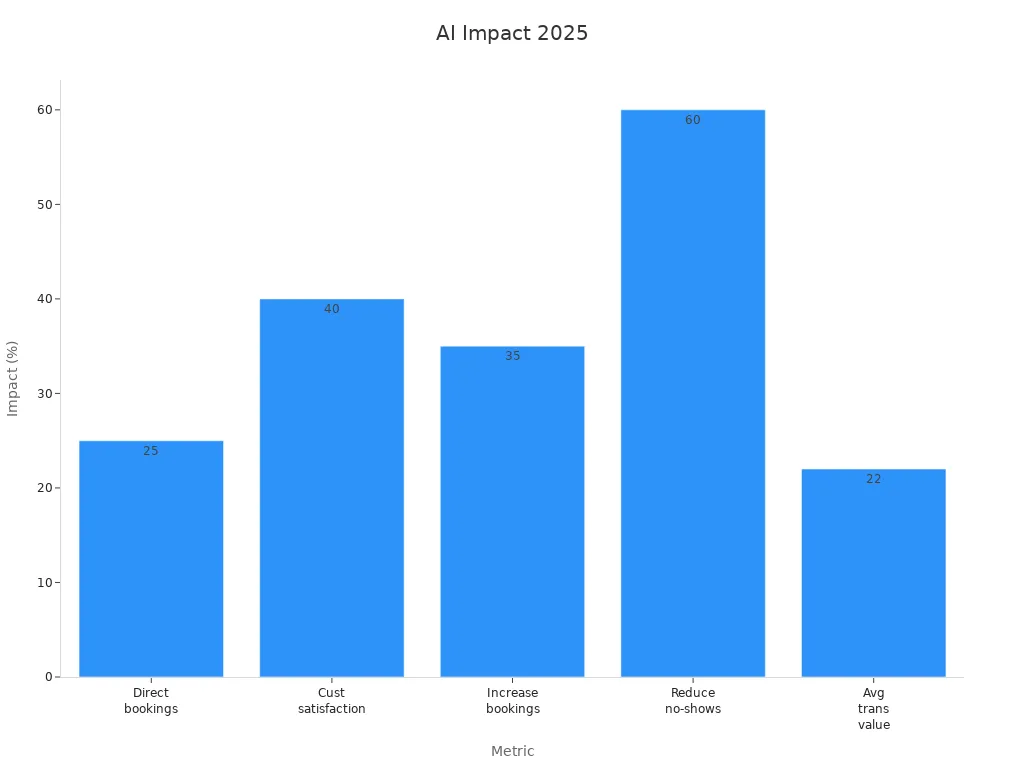
AI helps online travel agencies guess what you want. It looks at your past bookings and searches to show you the best choices. This makes booking easier and feels more personal. Experts think AI will keep growing quickly. The global AI market could reach $407 billion by 2027. Almost 90% of companies want to use AI for better service and lower costs.
You will see fewer mistakes, faster bookings, and better tips every time you use a reservation system.
Mobile and Personalization
You use your phone for almost everything, even booking trips and tables. Online travel agencies know this and make their apps simple to use. They send reminders, show deals, and remember what you like. Personalization keeps you coming back.
Here is how mobile personalization helps you:
Conversion rates show how many people finish bookings after getting personal offers.
Exit rates help apps see where users lose interest, so they can fix those spots.
User behavior analytics track what you tap and search, so apps can suggest better options.
A/B testing helps apps find out which features you like most.
Apps change what you see based on how often you visit certain screens.
You get special product tips, loyalty rewards, and alerts based on your location. This makes booking with online travel agencies easy and fun. You see content that matches your interests, which keeps you interested. Travel technology now connects your data across devices, so you get the same good experience on your phone, tablet, or computer.
Personalization means you spend less time searching and more time enjoying your plans.
You have watched reservation systems change a lot over time. They started with old mainframes that were simple and fast. Now, smart tools use AI to help you book right away. You get updates as soon as things change. The service feels more personal. Businesses save time and make more money. Customers like how easy and quick it is to book. You can also change your plans if you need to. Here is a table that shows how each generation is different:
Generation | Key Features |
|---|---|
Legacy | Fast but basic |
Hybrid | More flexible |
Modern | AI, mobile, data-driven |
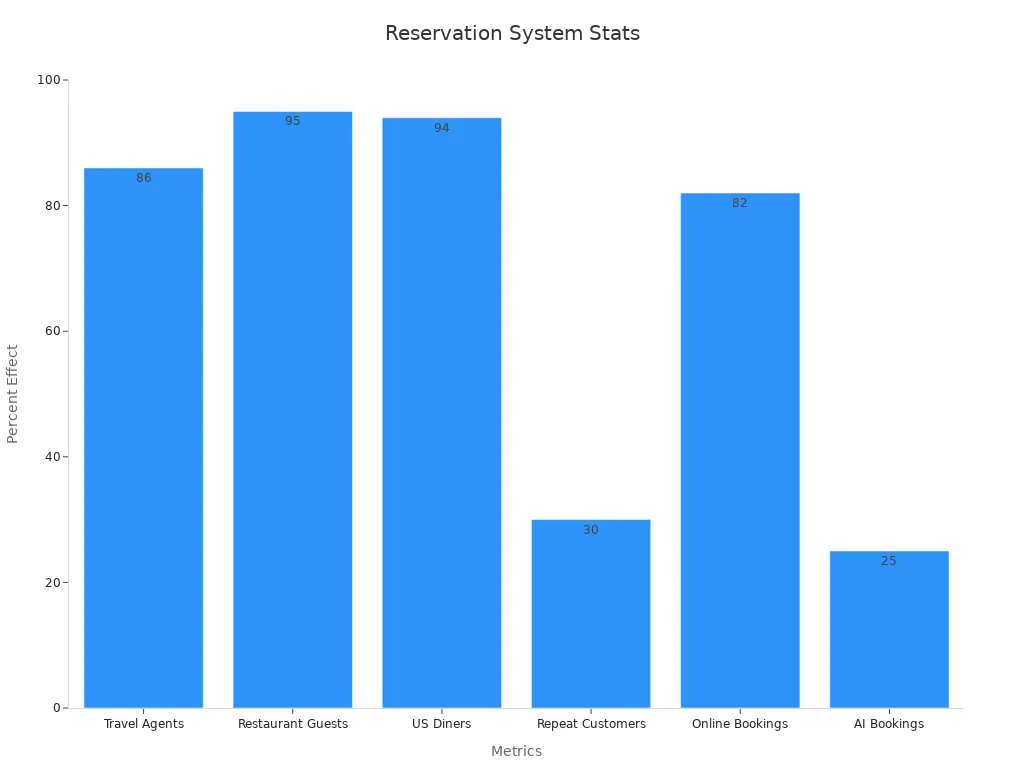
Think about how you book things now. If you switch to a modern reservation system, it could make things much easier for you and your customers.
FAQ
How do I know if a reservation system is secure?
Look for a lock symbol in your browser. This means the site uses encryption. You can also check for two-factor authentication or biometric login. These features help keep your information safe.
Can I cancel or change my booking online?
Yes! Most modern reservation systems let you cancel or change your booking with just a few clicks. You do not need to call anyone. You get a confirmation right away.
What devices can I use to make a reservation?
You can use your phone, tablet, or computer. Many systems also work with smartwatches. Some even let you book through social media apps.
Do I need to create an account to book something?
Not always. Some systems let you book as a guest. If you make an account, you can track your bookings and get special offers.
What should I do if I do not get a confirmation?
Tip: Check your spam or junk folder first. If you still do not see it, log in to your account or contact customer support. They can help you find your booking.
See Also
Upcoming Changes To Walmart Self-Checkout Access In 2025
Cloudpick Self-Checkout: Where To Find It And User Feedback
How Vending Machines Are Shaping Fast Food Automation Future
Tracing The Development And Growth Of Self-Checkout Systems
Exploring Vending Machines’ Advantages And Innovative Features Today
